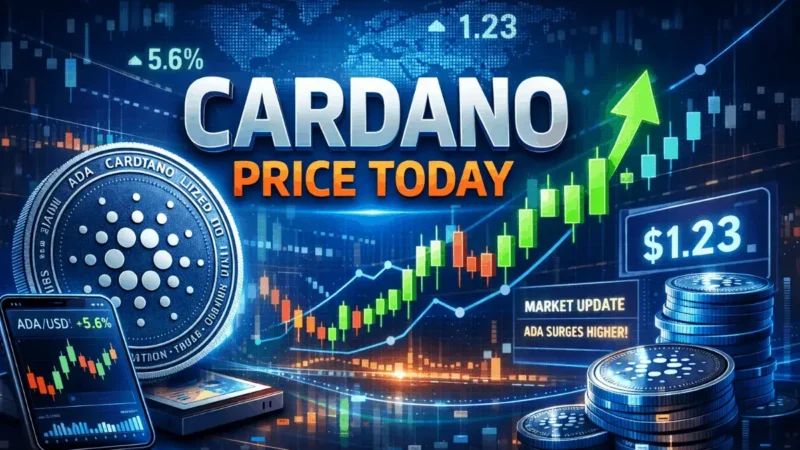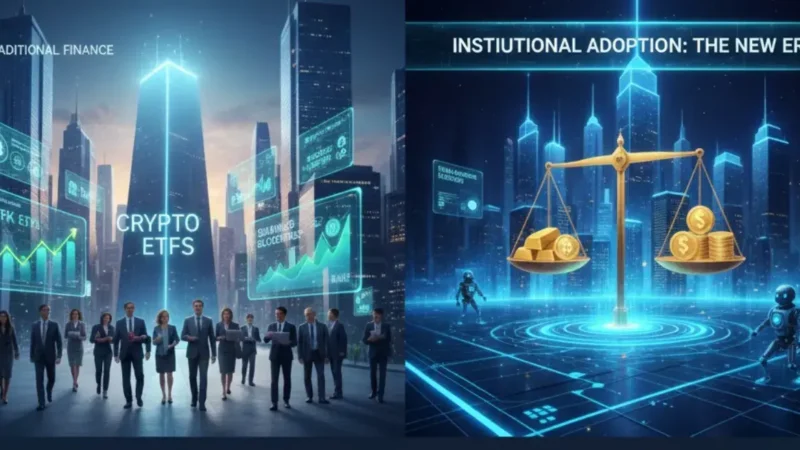Goldman Sachs: Institutional Investors Seek to Enter Cryptocurrency Market

According to Goldman Sachs, the cryptocurrency market is on the verge of a transformative era as institutional investors prepare for a significant influx. Over the past few years, regulatory clarity has emerged across various countries, fostering a favorable environment for crypto adoption. While regions like the European Union (EU) and Switzerland have taken bold steps to regulate and integrate digital assets, the United States still lags behind. However, there is growing anticipation that the U.S. will soon join the movement, potentially unlocking the participation of large international corporations and further legitimizing the market.
Table of Contents
Goldman Sachs on Bitcoin: A Beacon of Optimism for Crypto’s Future
In a recent interview with CNBC, Mathew McDermott, the head of Goldman Sachs’ Digital Assets Division, expressed optimism about Bitcoin (BTC) and the broader cryptocurrency space. He highlighted that the main rush of institutional investors into Bitcoin is yet to come, despite the ongoing interest in blockchain-based financial innovations.
As a representative of a leading investment bank, McDermott is uniquely positioned to gauge the market’s pulse. He shared that institutional clients have consistently shown high demand for digital assets, driving Goldman Sachs to expand its involvement in the sector.
Regulatory Clarity as a Catalyst for Institutional Interest
One of the critical factors enabling this shift is the increasing regulatory clarity. Over the past two to three years, governments worldwide have taken a proactive approach to crypto regulation, instilling confidence among institutional investors.
- In 2021, Switzerland introduced a legislative package to address blockchain and cryptocurrency governance, setting a global precedent.
- In 2023, the EU passed the Markets in Crypto Assets Regulation (MiCA), a landmark law that will fully take effect on December 30, further positioning Europe as a leader in the crypto space.
The U.S., however, remains a step behind. McDermott pointed out that this could change as the government takes a more defined stance on crypto regulation. He emphasized that a clear policy framework in the U.S. could unlock massive investments, particularly from large international corporations.
Large Corporations and Their Role in Bitcoin Investments
The prospect of major corporations investing in Bitcoin is a recurring theme. According to Bitcointreasuries.net, Bitcoin holdings by public companies are still limited but growing. A standout example is MicroStrategy, which currently holds a staggering 423,000 BTC, worth approximately $42.6 billion.
McDermott believes that with enhanced regulatory clarity, more corporations could follow suit. However, not all companies have embraced the trend. For instance, Microsoft shareholders recently voted against Bitcoin investments, while Amazon has faced calls to use Bitcoin as a store of value.
Blockchain’s Potential to Revolutionize Financial Systems
Beyond Bitcoin, Goldman Sachs sees immense potential in blockchain technology to transform the financial industry. McDermott emphasized that blockchain could replace existing systems, offering enhanced efficiency and cost-effectiveness.
To capitalize on this potential, Goldman Sachs is actively developing a platform for trading tokenized real-world assets. These assets, representing real-world entities like real estate or commodities, can be traded 24/7, bypassing the constraints of traditional stock exchange hours.
The Role of Bitcoin ETFs in Driving Adoption
The approval of Bitcoin spot ETFs in January marked a turning point for crypto adoption. According to McDermott, these ETFs have attracted over $100 billion in investments, introducing Bitcoin to a broader audience. This momentum is expected to drive further innovation, including the creation of tokenized assets that appeal to new demographic groups.
International Trends and the Future of Crypto Regulation
While countries like Switzerland and the EU lead the charge in crypto governance, the U.S. crypto policy remains under scrutiny. McDermott is optimistic that the U.S. will soon catch up, given the rising demand for regulatory certainty among institutional investors. The upcoming U.S. presidential administration is expected to prioritize crypto regulations, paving the way for large-scale investments.
In the meantime, international interest in crypto continues to grow. The passing of MiCA has set a high standard, attracting attention from global investors. Countries adopting similar frameworks could experience a surge in institutional crypto investments, boosting market confidence.
The Future of Institutional Crypto Adoption
Goldman Sachs remains committed to driving innovation in the digital assets space, recognizing the transformative potential of blockchain and cryptocurrencies. With increasing institutional interest, advancing technologies, and evolving regulations, the crypto market is poised for exponential growth.
McDermott’s closing remarks reflect the optimism within the industry: “There’s still a lot to come for crypto. The journey is just beginning.”
Stay informed, read the latest crypto news in real time!
FAQs About Goldman Sachs and Institutional Investors
1. What is Goldman Sachs’ role in the crypto market?
Goldman Sachs actively facilitates institutional involvement in crypto by offering trading platforms for digital assets and exploring innovations like tokenized real-world assets.
2. Why is regulatory clarity important for crypto adoption?
Clear regulations reduce uncertainty, making it easier for institutional investors to commit to the crypto market. This has been evident in regions like the EU and Switzerland, which have embraced comprehensive crypto laws.
3. How are Bitcoin ETFs influencing the market?
Bitcoin ETFs provide a regulated avenue for investors to gain exposure to Bitcoin, driving broader adoption and increasing market liquidity.
4. Which corporations are leading in Bitcoin investments?
MicroStrategy is a notable leader, holding 423,000 BTC. Other corporations are exploring investments as regulatory frameworks evolve.
5. What is the MiCA regulation, and why is it significant?
MiCA, introduced by the EU, is a comprehensive framework governing crypto assets. It ensures investor protection and fosters innovation, setting a global benchmark for crypto regulation.
6. How does blockchain technology impact the financial industry?
Blockchain offers increased efficiency, transparency, and cost savings, making it a game-changer for traditional financial systems.





9 thoughts on “Goldman Sachs: Institutional Investors Seek to Enter Cryptocurrency Market”